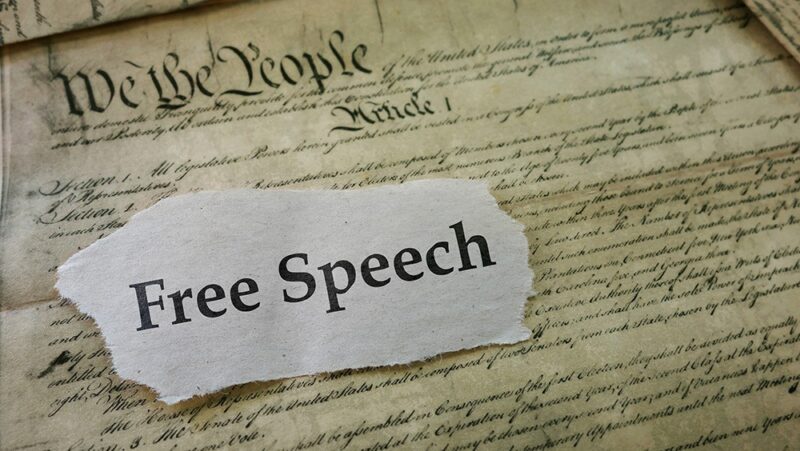When it comes to First Amendment rights, do we want a sword or a shield?

When it comes to your core freedoms, which would you rather wield to protect them: a sword or a shield?
The 45 words of the First Amendment haven’t changed since it was adopted in 1791, but how those five freedoms are interpreted and applied is shifting — alarming some even as it empowers others.
For much of our history, the amendment’s core freedoms have served as a shield. Our individual rights were protected from government overreach and persecution, defending what University of Virginia professor G. Edward White decades ago called “oppressed mavericks and despised dissenters.”
The U.S. Supreme Court and state lawmakers have both wielded a sharp sword in the past year to carve out legal exceptions that would reduce, restrict or criminalize speech and the right to assemble and protest. Those exceptions extended into public libraries and classrooms, physicians’ offices and public spaces.
Where once First Amendment rights were deployed to encourage the “marketplace of ideas” when all might speak and none would be silenced, litigation and lawmakers now tell teachers what ideas and activities — sometimes even what words – cannot be expressed.
As part of the fallout from the reversal of Roe v. Wade, multiple states have passed laws that forbid doctors from providing abortion information to patients. At least one law could criminalize such discussions with patients, advancing the idea that because abortion is now illegal in that state, the chat would constitute “aiding and abetting” a crime.
In Florida, there are challenges to a so-called “anti-woke” law that would control what professors and others can teach and what students can learn by restricting race-based conversation and analysis in business and education. "Without the freedom to engage in vigorous and robust debate about important issues and contentious concepts, a college education is just an exercise in memorizing facts and repeating government-approved viewpoints," says attorney Adam Steinbaugh of the Foundation for Individual Right and Expression. "That's not freedom or education."
In a Texas school district, new regulations now permit a parent or guardian to force libraries to pull a book from the shelves as soon as an objection is raised – with possible return only after a lengthy process.
How did the First Amendment work as a shield? A prime example stems from a 1941 U.S. Supreme Court ruling that Americans could be required to stand and recite the Pledge of Allegiance, even if some had an objection based on sincere religious beliefs. In the aftermath of the decision, those who still conscientiously objected suffered violence across the country. In 1943, a horrified court reversed itself, establishing constitutional protection for those who did not wish to stand for or recite the pledge.
The court declared not an exception for dissent over reciting the Pledge, but rather created a shield behind which all of us can decide our own definition and practice of patriotism. In a resounding declaration of that individual right, Justice Robert H. Jackson wrote that “If there is any fixed star in our constitutional constellation, it is that no official, high or petty, can prescribe what shall be orthodox in matters of politics, nationalism, religion or other matters of opinion.”
For much of the 20th Century, lawmakers and the courts protected the rights of individuals to assemble freely and protest for justice, refused to permit a dominant religious belief to override individual faith choices in public schools and defended even vulgar or insulting speech if it involved matters of public concern.
From permitting a critical press to do its watchdog role to protecting those engaged in comedy and satire, the right to speak freely found protection. Justices defended the right to conduct hateful protests at military funerals and rejected calls to censor violent video games.
But in 2018, Georgetown University Prof. Louis Michael Seidman wrote of a change in recent years: “Instead of providing a shield for the powerless, the First Amendment became a sword used by people at the apex of the American hierarchy of power.” And a few years ago, Supreme Court Justice Elena Kagan warned the court’s conservative majority, in ruling on a union fee case, had found a dangerous tool, “turning the First Amendment into a sword.”
As Kagan warned, we now have – particularly in the name of religious rights for some – carved out exceptions from laws aimed at battling discrimination and insuring equitable health care across society. There are now free-speech distinctions between most citizens and public employees. Election-reform era restrictions on how corporations can spend funds to influence elections have been slashed in the name of corporate free speech.
The sword that threatens a free press may be the most immediate, given that today’s news industry confronts challenges ranging from high-profile calls to revise long-standing defamation law to make it easier to successfully sue media outlets, to a relentless political campaign to paint journalists as biased “enemies of the people,” all while reeling from a devastated revenue structure that has dramatically cut both the number of newsroom staff and newspapers nationwide.
If we want an independent news media that will serve as a watchdog on our behalf over federal, state and local government officials, agencies and units, then we need to do our part to ensure that continues.
Support local news outlets, particularly startups and nonprofit organizations that track what happens at the state government level. Talk back to those on the left or right that use the media for propaganda, misinformation or disinformation. And spend a little on news reports to get a lot in return – if not to support a particular newspaper or website, then in support of democracy.
In this highly divisive social and political era, we need to recognize that the partisan political utility of a legislative or judicial sword to carve away at the First Amendment, even when swung in the name of freedom, may well cut your rights even as it carves out exceptions for some.
Gene Policinski is a senior fellow for the First Amendment at the Freedom Forum. He can be reached at gpolicinski@freedomforum.org.
First Amendment Stories of 2023: A Year in Review
18 Freedom of Speech Quotes You Should Know
Related Content

